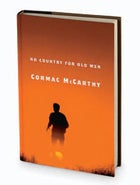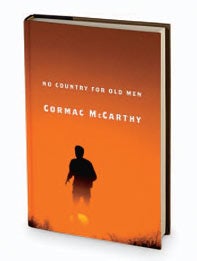Seven years after his last book, Cormac McCarthy is back—and the old cuss is leaner, meaner, and bloodier than ever. In his new novel, the famously reclusive New Mexican pens a furious tale of Southwestern noir with a body count approaching Tarantino-esque proportions.
cormac mccarthy

McCarthy is so famous for his Border Trilogy, the Odyssean horse opera laid out in All the Pretty Horses (1992), The Crossing (1994), and Cities of the Plain (1998), it’s easy to forget that his earlier works—such as 1985’s Blood Meridian—were marked by unrelenting violence. In the trilogy, McCarthy tamped down the mayhem in favor of lyrical descriptions. But No Country for Old Men is a different beast.
As if to warn off readers expecting another round of scabland pastoral, McCarthy opens his new novel with three pages of fierce, shocking violence, then never slows to catch his breath. The plot concerns an antelope hunter in the Texas borderlands who happens upon a drug buy gone bad: trucks, bodies, bricks of Mexican heroin, and a satchel containing $2.4 million. The hunter takes the money and runs, a drug-connected killer tracks him down, and a local sheriff cleans up the carnage left in their wake. It’s a road thriller told at reckless speed in stripped-down prose—as if Raymond Carver had novelized Natural Born Killers.
But the magnificence of No Country lies in its portrait of Sheriff Ed Tom Bell, a 19th-century-style lawman caught up in a late-20th-century narco war. A good man doing honorable work, Bell feels his life’s labor and beliefs crumble as he watches Chigurh, the killer, roam through his territory like an angel of death. For nearly 40 years Bell has tended an honest peace in Terrell County, Texas; now he can’t do a thing to stop the slaughter, and he blames himself. “If you got a bad enough dog in your yard,” he says, “people will stay out of it. And they didn’t.”
Half the pleasure in a McCarthy novel is the clipped dialogue, which helps him capture the aural flavor of Texas as vividly as Joyce bottled Dublin. Sizing up the scene of the drug massacre, a deputy remarks, “It’s a mess, aint it Sheriff?” “If it aint it’ll do till a mess gets here,” says Bell.
Sheriff Bell is an old man facing hard facts: You do your best, but the world gets worse. The bad guys get away. You get over it. No Country for Old Men seems written by a man facing similar truths. McCarthy has stripped off the layered descriptions of his previous books, as if he doesn’t have time for purty landscapes anymore. What’s left are desperate men talking about life, death, and fortune. And that’s more than enough. If No Country ain’t a full-blown masterpiece of western writing, it’ll do till one gets here.


